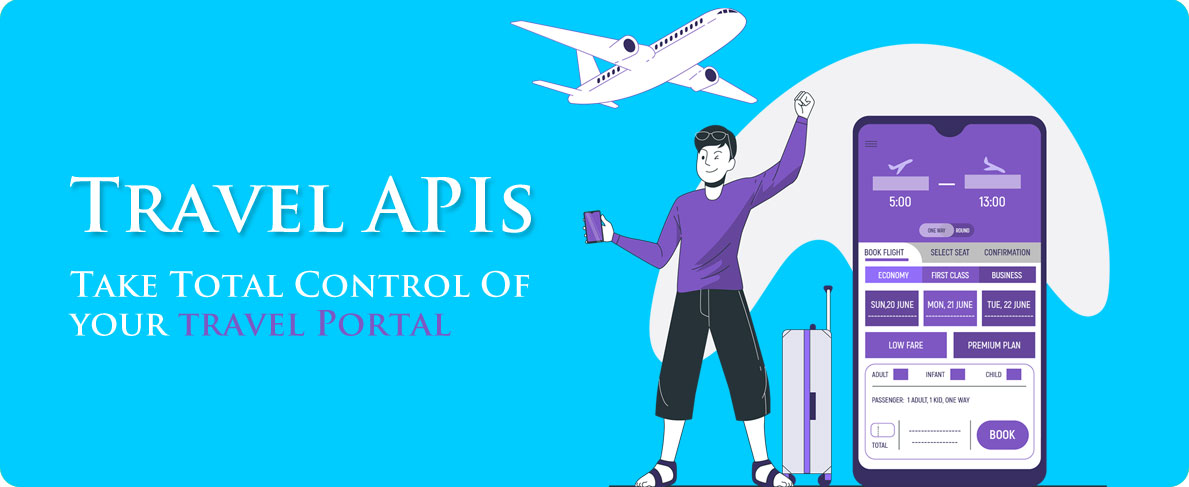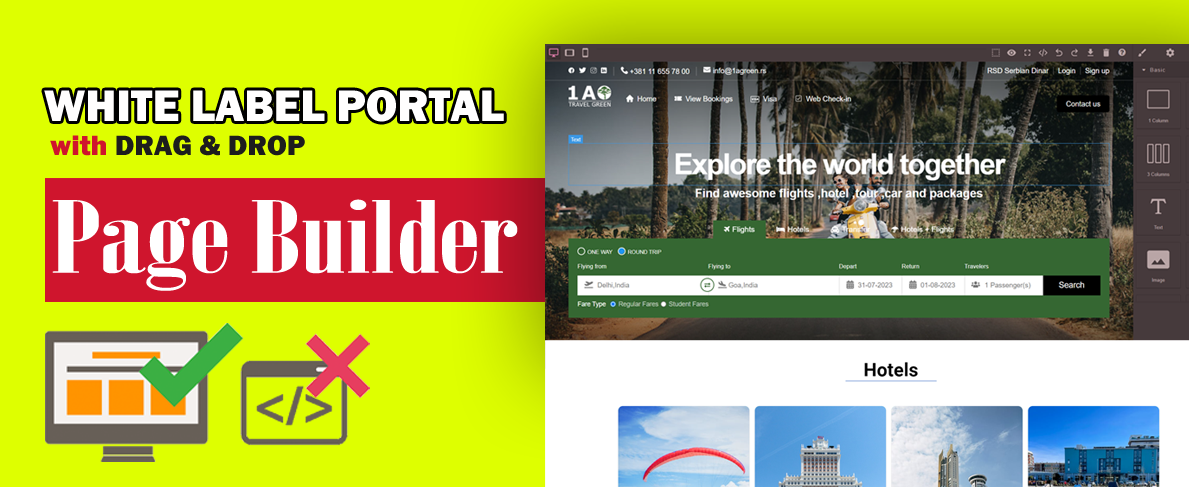-
Unlock the power of API integration! Discover why businesses in the travel industry can’t thrive without it. Uncover its benefits and our revolutionary solutions in this informative article. Dive into our insightful article for a competitive edge.
In the ever-changing landscape of the travel industry, companies are continually in pursuit of new strategies to remain competitive, streamline their operations, and elevate the customer journey. Among these strategies, API integration has emerged as an irreplaceable technology. As providers of travel-related solutions to businesses, we grasp the pivotal role that API integration plays in their triumph. In the following content, we will delve into the imperative reasons why businesses cannot thrive without API integration, uncovering its significance, advantages, and synergy with Adivaha, our state-of-the-art travel technology solution.
How does API integration work in the context of businesses and the travel industry?
API integration, or Application Programming Interface integration, is a technology that allows different software applications, systems, or platforms to communicate and share data with each other seamlessly. It enables businesses to access and utilize the functionalities and data of other software applications or services without the need for extensive custom coding. In the travel industry, API integration is used extensively for various purposes:
Booking and Reservation Systems: Travel businesses, such as hotels, airlines, and car rental agencies, can integrate with online booking platforms or reservation systems through APIs. This allows customers to make real-time bookings, check availability, and receive instant confirmations.
Inventory Management: API integration helps travel businesses manage their inventory effectively. Hotel chains, for example, can synchronize room availability, rates, and booking data across multiple online travel agencies (OTAs) through APIs.
Payment Processing: Payment gateways often provide APIs for businesses to securely process payments. This is critical for travel agencies and booking platforms to facilitate transactions.
Travel Content Aggregation: Travel agencies and meta-search engines aggregate data from multiple suppliers, including airlines, hotels, and tour operators, through APIs. This provides customers with a wide range of options in a single search.
Personalization: APIs enable businesses to access customer data, such as travel preferences and booking history, to offer personalized recommendations and experiences.
Marketing and Distribution: Travel businesses can integrate with marketing platforms and OTAs to reach a broader audience and distribute their services efficiently.
How does API integration contribute to the competitive advantage of travel businesses?
API integration contributes significantly to the competitive advantage of travel businesses in several ways:
Efficient Inventory Management: API integration automates inventory updates, ensuring that available resources are accurately reflected across all distribution channels. This reduces the risk of overbooking or under booking and minimizes manual data entry errors.
Seamless Booking: Travel businesses can offer a seamless booking experience by integrating with booking engines and reservation systems. This reduces friction in the booking process and increases conversion rates.
Partnerships with OTAs and Meta-search Engines: Integrating with online travel agencies (OTAs) and meta-search engines allows travel businesses to reach a larger audience and leverage the marketing and distribution capabilities of these platforms.
Reduced Development Costs: Utilizing pre-built APIs can significantly reduce development time and costs compared to building custom solutions.
Scalability: API integration allows travel businesses to scale their operations as they grow, accommodating an expanding customer base and increasing demand.
What measures are in place to ensure the security and reliability of API integrations in the travel sector?
Ensuring the security and reliability of API integrations in the travel sector is of paramount importance to protect customer data, maintain operational efficiency, and provide a seamless user experience. Several measures and best practices are in place to achieve these goals:
- OAuth (Open Authorization) is a standard protocol for secure authorization. It allows users to grant third-party applications limited access to their resources without sharing their credentials. OAuth is commonly used in travel API integrations to enhance security.
- APIs should use HTTPS (Hypertext Transfer Protocol Secure) to encrypt data transmitted between the client and server. This ensures that sensitive information, such as login credentials and payment data, remains secure during transit.
- Throttling allows APIs to slow down or limit requests from a particular client to prevent it from monopolizing resources and impacting the overall system’s reliability.
- Implement RBAC to define and enforce user roles and permissions. This ensures that only authorized personnel or applications can access specific API resources.
- Implement real-time monitoring of API traffic and performance to detect anomalies, such as unusual spikes in traffic or suspicious behavior.
What distinguishes Adivaha, your travel technology solution, in the context of API integration for travel businesses?
Adivaha, our travel technology solution, stands out in the context of API integration for travel businesses due to several key differentiation that make it a preferred choice:
We offer a comprehensive range of API integration solutions tailored to the unique needs of travel businesses. It seamlessly integrates with various suppliers, including hotels, airlines, car rental companies, and more, ensuring access to a vast inventory of travel products. Adivaha boasts a user-friendly interface that simplifies the process of managing API integrations. Even users with limited technical expertise can navigate the platform effortlessly, reducing the learning curve for travel businesses. We understand that every travel business has distinct requirements. It provides a high degree of customization and flexibility, allowing businesses to configure integrations, pricing, and offerings to align with their unique brand and business model.
Adivaha provides advanced analytics and reporting tools that enable travel businesses to gain actionable insights into their operations. These insights can be used to make data-driven decisions, optimize pricing strategies, and identify growth opportunities. We place a strong emphasis on security and reliability. It adheres to industry best practices for data security, encryption, and access control to protect sensitive customer information. Redundancy and fail-over mechanisms are in place to ensure uninterrupted service. Adivaha is designed to scale with the growth of travel businesses. Whether a business is a startup or an established enterprise, Adivaha can accommodate changing demands and expanding customer bases. We facilitate distribution through various channels, including websites, mobile apps, and partner platforms. This diversity in distribution helps travel businesses reach a wider audience and maximize their market reach. Adivaha offers exceptional customer support, providing prompt assistance and guidance to clients. A dedicated support team is available to address inquiries, resolve issues, and ensure a smooth experience.
Conclusion
In conclusion, API integration is the lifeblood of modern travel businesses. It empowers them to provide exceptional customer experiences, operate efficiently, expand their market reach, make data-driven decisions, ensure security and reliability, and achieve cost efficiency and scalability. At Adivaha, we are committed to helping travel businesses thrive through API integration. We invite you to embrace the future of travel technology with Adivaha, our cutting-edge solution that can propel your business to new heights. Partner with us for success in the ever-evolving travel industry.
Why Businesses Can’t Live Without API Integration
Recent Posts

















Leave a Reply